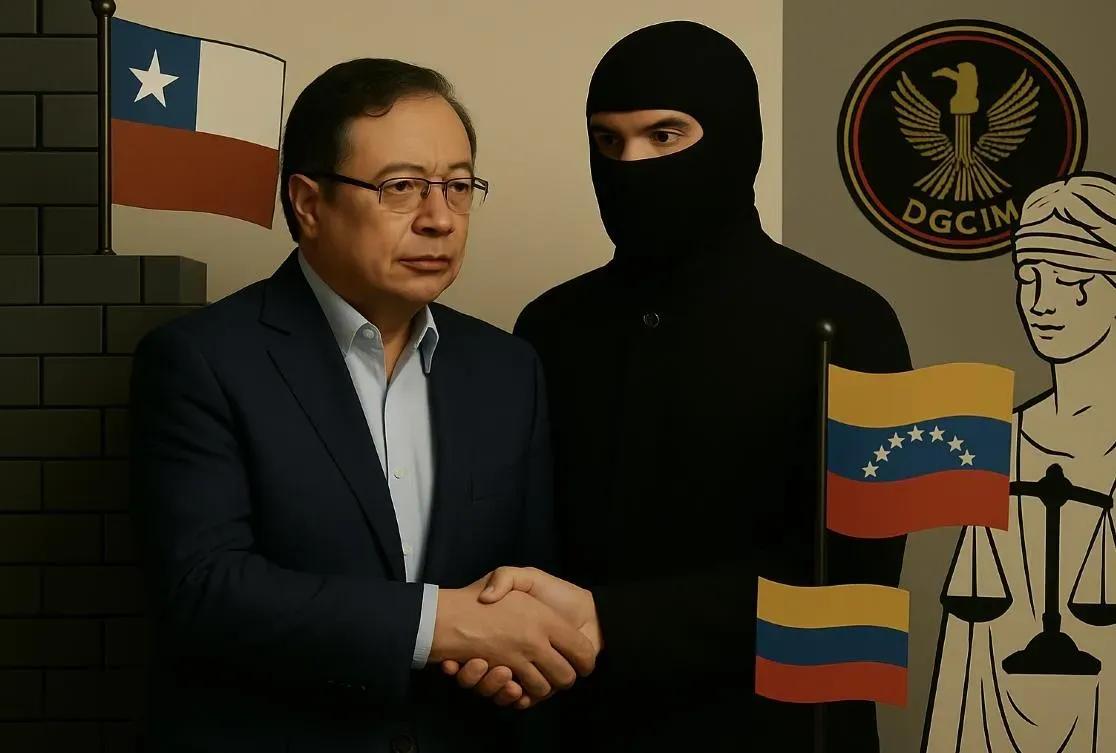William Acosta for Poder & Dinero and FinGurú
The death of former Venezuelan lieutenant Ronald Ojeda not only shocked the continent but also exposed the fragile trust ties that unite South American countries against organized crime and diplomacy. Chile, after finding evidence linking high-ranking officials of the Venezuelan government and the criminal network "Los Piratas de Aragua" to the murder, requested the extradition of those responsible. However, the response from Colombian President Gustavo Petro could define the course of regional justice: extradition to Chile, where the crime is being investigated, or to Venezuela, where, according to the investigations, the masterminds operate? This decision is not only technical; it is a moral test for the region, a scale between transparency and opacity, between respect for human rights and complicity in silence before impunity (BBC News Mundo, 2024).
Masterminds
Behind the crime of Ronald Ojeda lies a web of power that borders on fiction. According to the Chilean prosecutor's office, Venezuelan Interior Minister Diosdado Cabello Rondón would have been the organizer and financier of the murder, using the leader of the Tren de Aragua, known as "Niño Guerrero," as the operational arm (Biobío Chile, 2024). This not only places the crime at the heart of Venezuelan power but also reveals the sophistication of clandestine operations designed to silence opponents beyond borders.
Alongside Cabello, Lieutenant Colonel Alexander Enrique Granko Arteaga is mentioned, head of the Special Affairs Directorate of the DGCIM, an entity pointed out by Amnesty International (2024) as responsible for serious human rights violations. Forensic evidence links him directly to the crime scene, which, combined with his history of torture, makes him a key figure in understanding the repressive structure behind the political assassination.
Material Responsibilities and Facilitators
The machinery of crime also includes the direct executors. Johnny Orozco Castillo ("El Botija/Boti"), Carlos Francisco Gómez Moreno ("Carlos Bobby"), Luis Alfredo Carrillo Ortiz ("Gocho"), Larry Amaury Álvarez Núñez ("Larry Changa"), Rafael Enrique Gómez Salas ("El Turko") and Maickel Villegas Rodríguez are names that now appear in judicial records (CNN Chile, 2024). Several facilitators are also included, some with identities still protected, who operated in Chile, Colombia, and Venezuela, demonstrating the transnational reach of the network.
Arrests and Extraditions
The investigation has uncovered a network that operates with military precision. More than 20 people have been arrested in Chile, Colombia, the United States, and Costa Rica, with 13 of them formally charged as direct responsible parties for the kidnapping and murder (La Tercera, 2024). The extradition of Maickel Villegas Rodríguez to Chile was a symbolic step, but the real dispute centers on the fate of the leaders. Will they be tried in Chile, where there is judicial independence, or will they be handed over to Venezuela, where the justice system is internationally questioned? The answer lies in the hands of Gustavo Petro, whose ruling could alter the regional balance of power.
Modus Operandi and Evidence
The operation against Ojeda revealed a modus operandi as efficient as it is ruthless. The perpetrators used fake police uniforms, advanced concealment techniques, and a pyramid structure reminiscent of military forces. Their criminal diversification includes kidnappings, homicides, extortion, and human trafficking, showing the adaptive capacity of these organizations. Confidential testimonies and forensic evidence have allowed to connect the main implicated individuals, both at the crime scene and within the financing network (BBC News Mundo, 2024). The case has even reached the International Criminal Court, and Interpol alerts regarding the danger posed by those involved.
Conclusion
The Ronald Ojeda case is much more than a crime: it is a thermometer of South American political will. Gustavo Petro's decision on the extradition of those responsible will be a historic precedent. If the final destination is Venezuela, where justice is questionable and the masterminds remain in power, impunity will be perpetuated and regional cooperation weakened. If, on the contrary, Colombia supports extradition to Chile, a clear message will be sent: there is no room for organized crime or political interference in justice. South America has today the opportunity to demonstrate that transparency and respect for human rights are stronger than the power of criminal networks.
References
• BBC News Mundo. (2024, May). Ronald Ojeda: the crime that exposed a transnational political assassination network in South America. Available at: https://www.bbc.com/mundo/articles/cp9gvqy97lko
• Biobío Chile. (2024, April). Prosecutor Valencia confirms that the crime of Ronald Ojeda was ordered and financed by "powers" in Venezuela. Available at: https://www.biobiochile.cl/noticias/nacional/chile/2024/04/05/fiscal-valencia-confirma-que-crimen-de-ronald-ojeda-fue-ordenado-y-financiado-por-poderes-en-venezuela.shtml
• Amnesty International. (2024). Venezuela: Deepening crisis of human rights. Available at: https://www.amnesty.org/en/location/americas/south-america/venezuela/report-venezuela/
• La Tercera. (2024, June). Major PDI operation in Ronald Ojeda case has left more than 20 detainees in Chile. Available at: https://www.latercera.com/nacional/noticia/gran-operativo-de-la-pdi-en-caso-ronald-ojeda-ha-dejado-mas-de-20-detenidos-en-chile/2PGN6CZ6XBAZLPBNX5B4XY2OFA/
• CNN Chile. (2024, April). The prosecutor revealed the main accused in the crime of Ronald Ojeda. Available at: https://www.cnnchile.com/pais/fiscalia-dio-a-conocer-a-los-principales-imputados-por-el-crimen-de-ronald-ojeda_20240405/
About the Author
William L. Acosta graduated from PWU and Alliance University. He is a retired police officer from New York City, as well as the founder and CEO of Equalizer Private Investigations & Security Services Inc., a licensed agency in New York and Florida with international reach. Since 1999, he has directed investigations into narcotics, homicides, and missing persons cases, and has participated in criminal defense at both state and federal levels.
A specialist in international and multijurisdictional cases, he has coordinated operations in North America, Europe, and Latin America.

Comments